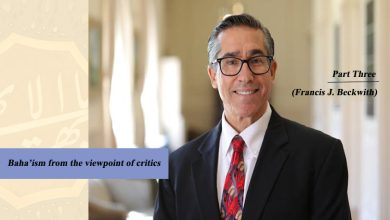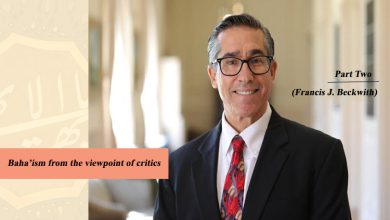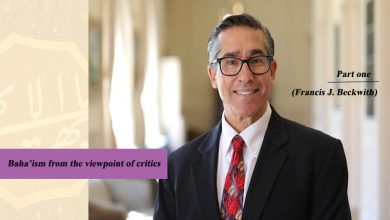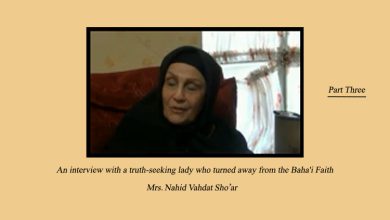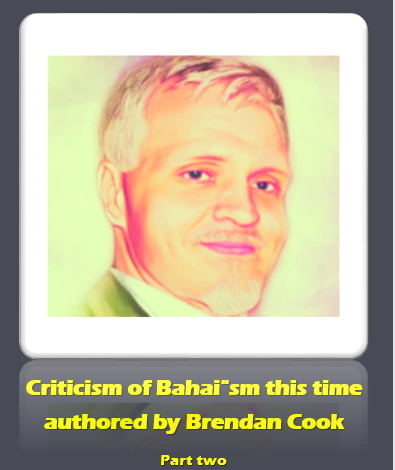
Published works written by Brendan Cook
It was said that Cook, after being rejected and expelled from the Baha’i community – due to his record of conflict with the Canadian National Assembly – unlike most Baha’i critics, did not struggle with the Baha’i organization and preferred to continue a peaceful life in America, because public struggle with the House of Justice (Bait al-Adl), could create many problems for him and other Baha’is who were interested in him. Thus, there are not many works of Cook in criticizing the Baha’ism. His remaining articles usually did not directly oppose the Baha’i organization, but expressed criticisms in the form of humor and creative and academic satire. We present and explain some of his articles below.
Obedience, reason and difference in the Baha’i Faith
Brendan Cook’s conversation with Ann Boyles, a member of Continental Board of Counselors for the Americas September 2006)
In this article, Mr. Brendan Cook expresses some of his views about the Baha’i Faith and raise various criticisms to parts of which were already mentioned. Of course, since this conversation took place in the form of an interview with one of the important people of the Baha’i organization, Cook could not express all his opinions freely and openly, and in some parts of the interview, he was forced to accompany the opinion of a member of the Baha’i organization.
The story of “Max” the infallible donkey written in 2006
This story is a satirical critique on the functioning of the International House of Justice and its views and decisions. In this article, Mr. Brendan Cook, with the language of humor and allegory, protests to topics such as the infallibility of the House of Justice, the lack of women in the House of Justice, the exaggerated, incomprehensible and useless messages of the House of Justice, the unaccountable spending from the pockets of Baha’is, the rejection and expulsion of Baha’i critics, setting strict conditions for the marriage of the Baha’is according to the rules of the Holy Book (Kitab-i-Aqdas), which were practically unenforceable in Western countries and still have not been implemented; forcing everyone to buy spiritual books and participate in low-content meetings for those who have many years of experience in Baha’ism; ordering others to advertise Baha’ism, without having an ear to hear the opinions of others; failure to respond to the comments and views of the Baha’is on the part of the assembly and various other issues. So, it is necessary to read the original story.
The story of Max begins when a villager named Mr. Dan Thomas claims that his donkey named Max is not an ordinary donkey, but is immune to all mistakes and knows everything and is able to answer all questions and solve all problems.
Some villagers asked how a donkey that does not even have the power to speak can make infallible statements. Don Thomas, the owner of the donkey, explains that it was not easy to teach Max to express his views, and the secret lies in his training. “I have taught Max to stomp his foot once to say ‘yes’ and twice to say ‘no’. The donkey could make Dan Thomas understand his opinion by stomping his foot a few times or wagging his tail back and forth for a more precise answer. Mrs. Marshall, one of the villagers present intervened and asked, what is your reason is for introducing this donkey as infallible?
“I say Max is infallible,” said Dan; “He himself says that he is infallible! We have to trust what he says” he continued.
Mrs. Marshall didn’t look entirely convinced by this, but since everyone else was waiting to start talking to Max she didn’t say anymore. The people who had questioned lined up in a row, and the ones who didn’t move to where they could best watch the proceedings. Everyone wanted to see what an infallible donkey looked like. Max looked like a regular donkey, he acted like a regular donkey, sounded like a regular donkey, and even smelled like a regular donkey; but because he was an infallible donkey he somehow seemed more interesting. Most of the questions people asked were fairly trivial. They asked things like “what should I eat for supper, Max?” or “Max, should I wear my red shirt tomorrow?” or “what’s the best place for a family picnic?” Max answered all of this just as Dan had said, tapping his hoof and switching his tail after each question. Things might not have gone so smoothly if Dan hadn’t been there to explain Max’s answers, but between the two of them they satisfied almost every comer.
Most families had enough trouble buying shoes or school clothes – bank payments or doctor’s bills were out of their reach. And so some of the people who came to see Max on that first day seemed worried about more than just the name they should give their new calf or what color to paint their bam. They said things like “how am I going to pay my mortgage Max?” or “Max, what am I going to do if I can’t afford new livestock?” it wasn’t that Max didn’t answer these questions as he’d answered the others, but that the people didn’t seem as pleased what he told them. The more people listened to the donkey’s answers, the more they realized that there are questions that even an infallible donkey cannot give a clear answer to. In the continuation of the story, Max finds a special status among the villagers, but the issuance of new messages and instructions by Max not only does not remove the problems from the shoulders of the villagers, but also adds problems to the problems of the villagers every day.
The Emperor’s New Clothes
Written in 2010, Satirical criticism about the position, views and performance of the International House of Justice
In this article, Cook addresses the claims and statements of Peter Khan (the then member of the House of Justice) who claimed that a Baha’i person should accept all Baha’i content and teachings without examination and that opposing Baha’i teaching will have adverse consequences for him!
The story is about the biography of an emperor in ancient times. He liked to have the best of everything. Even good things were not enough for him. He wanted the best food and the best clothes and the best art and the best entertainment. He had a wardrobe that was very expensive. This emperor had thousands of different clothes and the most shoes; he never had to wear the same clothes twice.
Of course, it is not surprising that all this could not make him happy. She always wanted more and this was especially true of her clothes! The emperor was looking far and near for someone who could expand this treasure of clothes. He paid more and more money to whoever could design newer and more attractive clothes. He had everything, but none of the previous tailors could satisfy him. Incidentally, one day, two new tailors came to his country and court, two men he had never met. (Allusion to Bab and Baha)
The two tailors claimed to be men of God, monks, or something like that. They were people of worship. Men who spent most of their time talking about religion, God, and faith and leaving things such as the lusts and bad manners of young people. Their true character and nature was not known, but because they opposed everyone and everything, they were respected by everyone as pious and holy people. Those two men of God came to the emperor with new information and astonishing news.
They informed that they had a weaving workshop which was not like any workshop that had existed before in the empire. They would be able to sew clothes 9 (referring to the sanctity of the number 9 in Baha’ism) times faster than the fastest former tailors of the Empire, and the clothes would be much more beautiful. Of course, it was not a magical weaving workshop. They explained that it was a spiritual weaving workshop. Both men said they were against magic. They told the emperor that this spiritual nature was specific to their weaving. The lovely clothes produced by them are indescribable and only religious and spiritual people see them; or people with “extreme and high spiritual wisdom”!
The two tailors did not say that only very intelligent people could see the clothes made in their weaving workshop. They said that only God-fearing people with correct religion and belief can see it. People who see the world with the eyes of faith! (Criticizing the views of Penelope Walker, the Continental Counselor of the Baha’is in America at that time) People who have what they call extreme and high spiritual wisdom! I don’t think you want to hear everything they said, because they said a lot; but I want to lead you to the main idea.
Your Highness! There are deep spiritual principles that require deep spiritual insight to understand. If someone wants to argue about them from a material point of view, it is better to refrain from answering them. The basis of these beliefs and teachings is not rational and logical, but spiritual, so someone who has been blinded by the glamor of materialism cannot be convinced with spiritual principles.
Your Highness! This is the only problem with the new clothes we make for you, because our weaving workshop is a spiritual workshop and the clothes are woven there spiritually and the eyes of those who lack spirituality do not see it! Only those who have given up their fashionable claims of materialism and only those who have strong and high spiritual wisdom will be able to see your new clothes! Those who have a limited spiritual view and are not aware of the spiritual aspects of life will not see your clothes. But Your Highness! This is really a great privilege because you have the opportunity to show yourself and your spiritual reality to the people around you. By wearing the new clothes that we sew for you, you will teach the lesson of faith in spirituality and the unseen, and if some disobedient and disobedient people are rejected by seeing your clothes, this will be a reminder for them and a proof of their limited vision and the limitations of materialism. Finally, the emperor appeared in public in his new clothes. Most of the people spoke about the beauty of his clothes and each of them admired the clothes from one new dimension; but the main story began when an old man, whom no one had seen before and who seemed very strange, told the attendees that the emperor had no clothes on and that he was naked! The two tailors who held important status before the emperor stood up simultaneously and shouted, “The old man is lying, arrest him,” and before anyone knew it, the emperor’s bodyguards arrested the old man and imprisoned him, and I heard that he spent most of his life in prison.


